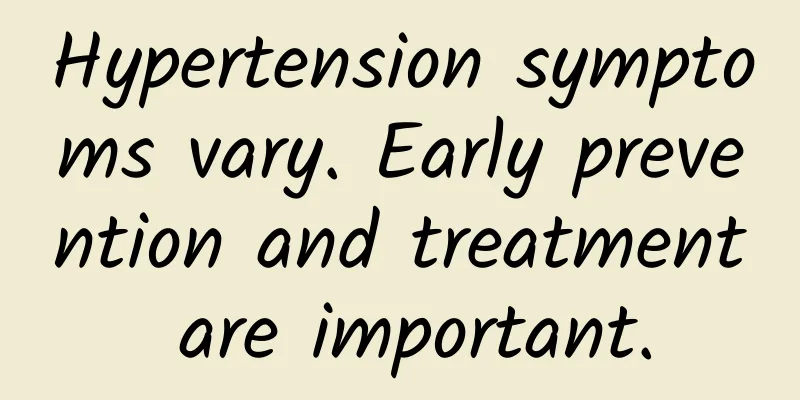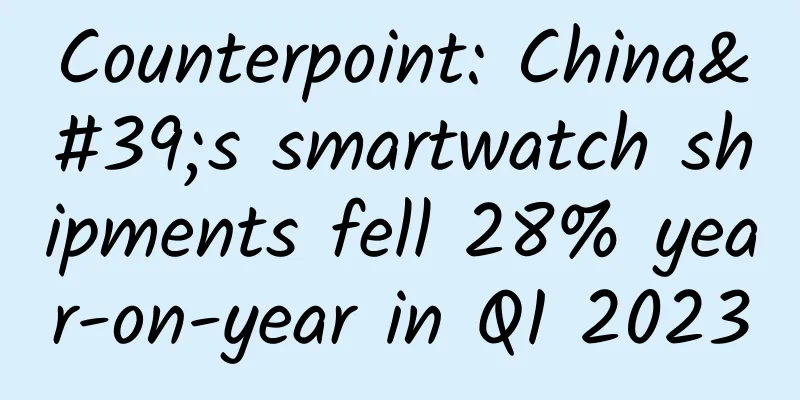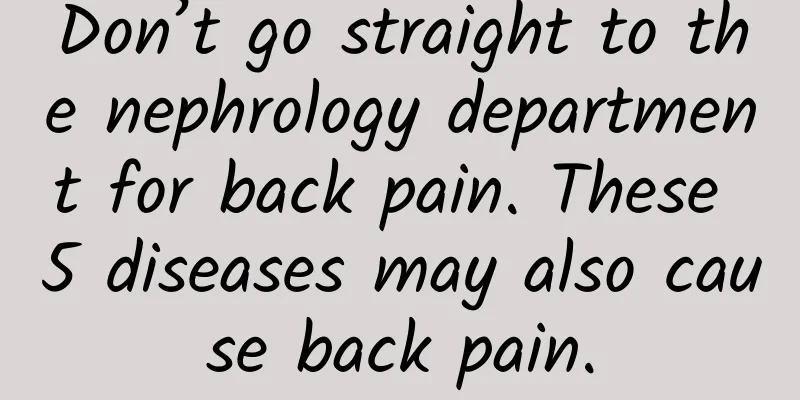Hypertension symptoms vary. Early prevention and treatment are important.

|
Hypertension is a chronic disease that everyone is familiar with, especially among the middle-aged and elderly. The prevalence of hypertension is relatively high. Due to individual differences, the symptoms of hypertension are different for each patient. In addition to understanding the various symptoms of hypertension and identifying hypertension as early as possible, we must also do a good job in early prevention and treatment of hypertension, and pay attention to preventing the disease before it occurs and preventing the disease from changing. So, what should we do? This article will explain it to you in detail. 1. How is hypertension defined? Without taking antihypertensive drugs, blood pressure is measured three times a day. If the systolic pressure is greater than 140 mmHg, or the diastolic pressure is greater than 90 mmHg, it can be diagnosed as hypertension. Hypertension can be divided into primary and secondary types. Most patients are primary. At present, the World Health Organization divides hypertension into three levels: level one is 140/90mmHg-159/99mmHg, level two is 160/100mmHg-179/109mmHg, and level three is above 180/110mmHg. Hypertension is a "silent killer". Many patients have no signs before the onset of the disease, but their blood pressure suddenly soars. Hypertension can cause damage to the heart, brain, kidneys, fundus and other parts of the eye, causing serious conditions such as stroke hemiplegia, hemiplegia, dementia, etc., which brings huge mental and economic burdens to patients and their families. 2. What are the symptoms of hypertension? How to detect and intervene early? Different people have different symptoms of hypertension. In the early stage of the disease, there may be no symptoms or the symptoms are relatively hidden. If the patient has afternoon headaches, throbbing headaches, dizziness, snoring, palpitations, limb numbness, nausea, edema and other symptoms, they should be alert to early symptoms of hypertension. During the development of the disease, the patient's blood pressure will continue to rise, and at the same time, they will show symptoms such as inattention, memory loss, limb numbness, increased nocturia, palpitations, chest tightness, and fatigue. The severity of the symptoms of hypertension is determined by the blood pressure level. In general, as the blood pressure increases, the symptoms will become more and more severe. If the blood pressure rises suddenly, headaches, vomiting, palpitations, dizziness and other symptoms will occur, and in severe cases, unconsciousness and convulsions may occur, which may have caused damage and lesions of important organs such as the heart, brain, and kidneys, or more serious conditions such as cerebral infarction, myocardial infarction, and renal failure. In principle, we recommend that people over 35 years old measure their blood pressure at least once a year to prevent early abnormal blood pressure in time. 3. Early detection and early intervention of hypertension should follow the following principles As a chronic disease, hypertension has no complete cure. Once diagnosed, patients usually need to take medication for life. Under the premise of correct medication, the patient's blood pressure can be effectively controlled. During medication, patients should follow the following two principles: 3.1 Medication varies from person to person There are many types of antihypertensive drugs, and their use must be tailored to the individual. Some people have mild symptoms and good physical fitness, so a small dose or a single medication may be enough to achieve the desired effect. Some people have difficulty controlling their blood pressure, and need a professional doctor to formulate a dosage or treatment plan based on the actual situation. 3.2 Minimum dose of medication In the early stage of hypertension treatment, the minimum dose must be selected. If blood pressure cannot be controlled, the dose must be gradually increased after evaluation by a doctor. Do not use a large dose in the early stage of medication, as this may cause the patient's blood pressure to drop rapidly, resulting in hypotension, which may endanger the patient's life in severe cases. 4. Preventive and therapeutic measures for hypertension 4.1 Diet Chinese medicine suggests that in the prevention and treatment of hypertension, we must pay attention to less salt and less oil, and the daily salt intake per person should not exceed 6g. Nowadays, many people like to eat high-fat, high-calorie foods. This simple and fast way of eating allows people to consume a lot of calories. Some beverages, such as Coca-Cola, have very high sugar content; long-term high-salt, high-sugar, and high-fat diets will affect the body's metabolism and abnormal blood lipids, accelerate atherosclerotic lesions in important organs such as the heart, brain, and kidneys, and thus cause hypertension. Many people like to eat foods rich in trans fatty acids, such as using cream and cocoa butter instead of chocolate and cakes. These things are high in calories, and trans fatty acids can also increase blood viscosity, which can easily lead to obesity, hypertension, coronary heart disease and other diseases. Therefore, hypertensive patients must make adjustments in their diet! Eat more fresh vegetables, fruits, soy products, grains, etc. 4.2 Adhere to medication Hypertensive patients generally need to take medication for a long time. Patients should not reduce or stop taking medication just because they feel they are doing well recently. Hypertensive patients should measure their blood pressure regularly, even when taking medication, so that they can better control their blood pressure. In addition, regular testing of liver function, kidney function, blood lipids and three or five items of hypertension are of great help in the diagnosis and treatment of hypertension. The three indicators of hypertension are plasma renin, angiotensin II and aldosterone; in addition to the above three items, the five tests also include cortisol and adrenocorticotropic hormone. These tests are mainly to guide the diagnosis and treatment of hypertension and post-healing evaluation. 4.3 Preventing diseases (1) Don’t stay up late In recent years, as the pace of life has become faster and faster, many people are used to staying up late at night. Staying up late is a very important cause of high blood pressure. Going to bed too late at night will cause the sympathetic nerves to lack sufficient rest, thus accelerating the heartbeat, constricting blood vessels, and increasing blood pressure. Therefore, we should change the bad habit of staying up late, go to bed before 10 pm, and sleep at least 8 hours a day. If your biological clock makes it difficult to fall asleep before 10 o'clock, listen to music before going to bed, stay away from electronic devices, or drink a glass of hot milk, all of which can help you fall asleep quickly. (2) Don’t be angry According to traditional Chinese medicine, emotions are also closely related to high blood pressure. The Yellow Emperor's Classic of Internal Medicine states: "Joy, anger, worry, sadness, fear, and anger, fear, anger, and fear are all triggered by each other, and the sight of emotions can cause troubles, and fear can cause all kinds of diseases." "The seven emotions stimulate the internal organs." "Anger can cause evil spirits to rise and yang qi to stagnate, and stagnation can cause blood qi to flow." In the process of preventing diseases, we must pay attention to regulating emotions. If a person is impatient and easily angry, then he is more likely to suffer from high blood pressure. Therefore, we should maintain a stable mood and be more tolerant of people and things around us, so as to promote the smooth flow of qi and blood. For those who are under great pressure from work and study, we should pay attention to relaxation and not keep themselves under high pressure for a long time. (3) Do not smoke or drink To prevent high blood pressure, you also need to quit smoking and drinking. Nicotine and alcohol can increase the risk of coronary artery disease, and therefore can cause high blood pressure. Therefore, for the sake of your own health, you should quit smoking and drinking as soon as possible, try not to inhale secondhand smoke, and stay away from people smoking around you. (4) Not being lazy Traditional Chinese medicine recommends that patients with hypertension exercise for 150 minutes a week. We can divide these 150 minutes into 5 days, 30 minutes a day. You can choose to exercise by jogging, brisk walking, swimming, yoga, etc., but be careful to avoid strenuous exercise to avoid increasing the cardiopulmonary load. If you feel uncomfortable during exercise, stop immediately, sit down and rest for a while to stabilize yourself. 4.4 Preventing the disease from getting worse The "prevention of change" in "preventing disease from changing" refers to target organ damage and cardiovascular complications caused by hypertension. What should be paid attention to are patients with different degrees of hypertension who have not yet developed target organ damage and cardiovascular complications. This group of people needs early detection, early diagnosis and early treatment. The key is to successfully control blood pressure to meet the standard. On this basis, intervene in risk factors and protect target organs. Lowering blood pressure can reduce the risk of cardiovascular and cerebrovascular diseases. For people with higher risks, controlling blood pressure is especially important. Once a person suffers from hypertension, major organs, such as the heart, heart, and kidneys, will become target organs. By changing lifestyle habits and reasonably selecting various antihypertensive drugs to lower the already elevated blood pressure, while strengthening the protection of target organs and preventing the occurrence of cardiovascular and cerebrovascular diseases, the mortality rate of patients will be significantly reduced. Patients can achieve the purpose of adjusting blood circulation and lowering blood pressure by stimulating certain acupoints with acupuncture. Acupuncture is an effective method for treating hypertension in traditional Chinese medicine. In clinical practice, acupoints such as Neiguan and Taichong are often used, which have a blood pressure-lowering effect. And there are no adverse reactions, and better results can be achieved when combined with oral Chinese medicine. At the same time, tea substitutes, Chinese medicine foot baths, and acupoint massage are also commonly used methods of TCM to treat hypertension. Patients can choose the appropriate method based on their own situation. At the same time, patients with hypertension should pay attention to controlling their weight: Body mass index (BMI), also known as body mass index, is calculated by dividing weight (kg) by height (m) squared. The ratio obtained by this formula can reflect the density of the human body to a certain extent. Under normal circumstances, the body mass index (BMI) of adults in my country is within the normal range of 18.5 to 23.95kg/m2. Below 18.5kg/m2 means that the weight is too low, and above 23.9kg/m2 means that the weight is overweight or obese. Patients should lose weight reasonably according to their BMI. It is generally recommended to lose 10% of the total body weight each year. Early detection, diagnosis and treatment of hypertension play an important role in controlling blood pressure, improving symptoms and preventing complications. For high-risk groups, regular physical examinations should be conducted, and attention should be paid to blood pressure measurement during the physical examination. Regardless of whether it is high risk or low risk, if high blood pressure is found during the physical examination, a detailed examination must be done under the guidance of a doctor. If you already have high blood pressure and also have symptoms such as headache, dizziness, tinnitus, fatigue, and arrhythmia, you must cooperate with the doctor to actively take medication and do a good job of daily care to stabilize your blood pressure. Disclaimer: The pictures in this article are from the Internet |
<<: A small stent opens the lifeline of the iliac vein
>>: Suddenly you can’t see clearly? People with “three highs” should be careful!
Recommend
5 Wrong Ways to Wear Underwear That Hurt Your Breasts the Most
Different styles of underwear make women more cha...
What is the success rate of fallopian tube unblocking surgery?
Whether the function of the fallopian tube is nor...
What kind of fruit is cherry? How many varieties of cherry are there?
Cherries are bright in color, crystal clear and b...
Several issues on allergic rhinitis in children
Allergic rhinitis is a common allergic disease in...
How to solve the symptoms of bladder obstruction in women?
The bladder is a very important urinary organ tha...
Sweating after abortion
Under normal circumstances, night sweats after ch...
What should women eat to replenish their qi?
Replenishing qi for women is not only for those w...
What does leucorrhea routine cleanliness 2 degrees mean?
If a woman feels that her leucorrhea is abnormal ...
What is the nutritional difference between white shrimp and green shrimp? Is Taihu white shrimp considered seafood?
White shrimp is a common type of shrimp. Because ...
How many days after the menstrual period ends should the follicle test be performed?
As we all know, the chance of pregnancy between m...
How long after abortion can you get pregnant?
Currently, abortion is a relatively minor gynecol...
Can I have an induced labor at 16 weeks?
Some women have to undergo induced abortion due t...
What to do when diving with myopia? Can you open your eyes when diving?
Myopia has many inconveniences. It is difficult t...
How to make milk and egg white mask
Many of our female friends are particularly conce...
How many Xiaohongshu surprise boxes are there in a day? When will the Xiaohongshu surprise boxes end?
Xiaohongshu's surprise box is a very powerful...









